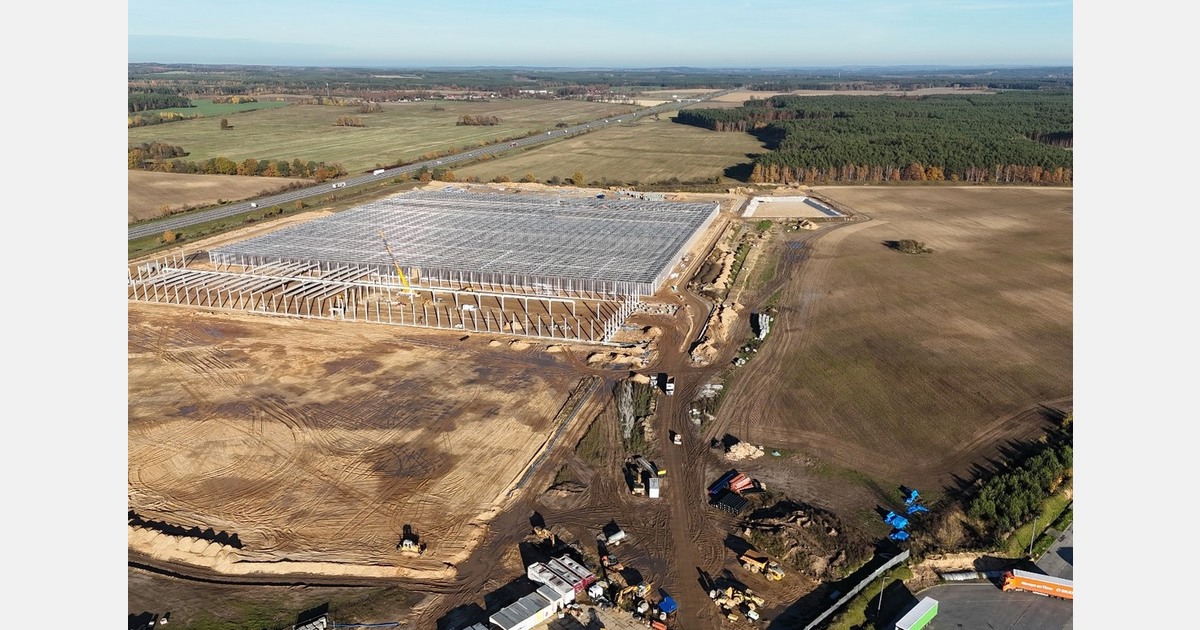Tomato producer Citronex is expanding its operations by growing its own young tomato plants. To make this possible, the Polish company is building a new greenhouse dedicated to plant propagation. In the long term, Citronex also plans to supply young plants to other growers.
This is just one of several projects the company has underway. In Romania, Citronex is constructing another greenhouse, and in Poland, it is investing in new boiler houses at its Siechnice sites.
According to Andrzej Kornafel, who manages investment projects for the company’s vegetable division, starting a propagation operation is a completely new direction for Citronex. The company, which is also involved in the banana trade (including in Romania) wants more control over its entire production chain.
“Propagation is new for us,” Kornafel says. “Because of the Tomato brown rugose fruit virus (ToBRFV), it has become more important than ever to manage every stage, from propagation to production. We also have our own standards for how our plants should be grown. By building our own propagation greenhouse, we’re investing in consistency and reliability.”
A separate location with its own identity
The new propagation facility will be located in a different region of Poland from Citronex’s existing tomato greenhouses, which cover almost 80 hectares. “We’re building along the A2 motorway, toward Poznań in western Poland,” Kornafel explains. The site was chosen to minimize virus risk, as it is far from Citronex’s current greenhouses and other tomato producers. “Our propagation company will operate as an independent branch with its own team.”
Starting next year, Kornafel himself will become director of the new propagation division. For now, Citronex will continue buying young plants from an external Polish propagator. “In the first year, we won’t produce all our young plants ourselves. Doing everything at once would be too much of a logistical risk.”
 © CitronexThe new propagation facility is being built in two phases, along highway A2 towards Poznan, thus separated from other Citronex cultivation locations and away from other greenhouses. 200 million euros is being invested in the project.
© CitronexThe new propagation facility is being built in two phases, along highway A2 towards Poznan, thus separated from other Citronex cultivation locations and away from other greenhouses. 200 million euros is being invested in the project.
Technically advanced and hygienic
By April, Citronex plans to open its new propagation greenhouse, beginning a test phase for producing young plants. By July, the company expects to be growing part of its own tomato plants there. The new propagation business, whose brand name will be revealed later, also intends to supply plants to other growers, including fruiting crops and crops like brassicas. There are also plans to produce hobby and ornamental plants for the retail market.
“We’re going to do things that haven’t been done anywhere else,” says Kornafel. After a short time away, he returned to Citronex in September 2024. “We plan to automate grafting completely and maintain very high hygiene standards. For example, we’ll disinfect our drain water with ozone. The entire facility is being designed to let our staff work in the cleanest possible conditions.”
The first stage of the project covers 6.9 hectares, divided into 11 separate compartments to keep crops strictly isolated. Next to the greenhouse, a 2-hectare hall will house irrigation systems. “Each compartment can be managed independently, and we’ll be able to use three different fertilizer formulas,” Kornafel explains.
The greenhouse will include ebb-and-flow floors, LED lighting, and separate logistics systems for different crops. “It’s going to be a showcase of high-tech horticulture.”
In the second stage, Citronex will build another 4 hectares of greenhouse space on the other side of the irrigation hall. Once the first 6.9-hectare phase is operational, the company will already have enough capacity to grow all its own tomato plants. “During summer, when we can propagate plants quickly, the greenhouse will be fully in use. In other seasons, we’ll focus on producing plants for other growers.”
Expanding tomato production in Romania
Citronex’s growth extends beyond Poland. The company, already active in banana trading in Romania, is now moving ahead with tomato cultivation there. The project was first announced several years ago, and construction is now approaching. “Groundwork has already started,” says Kornafel. The company is finalizing permits and selecting contractors. “We plan to start building in March.”
The Romanian site will include a 10-hectare greenhouse for tomato production, with space reserved for another 10 hectares in the future. “We plan to start operations with a lit crop by October next year.” The tomatoes will be sold on the local market, and the plants will come from Citronex’s new propagation facility in Poland.
Recruiting new talent
As Citronex expands in both propagation and cultivation, it is also building its team. “For our tomato production in Romania, we’ve already hired a crop manager, but we’re still looking for experts for our propagation business.”
The company is also hoping to attract skilled workers from abroad. “We want to encourage Poles who have worked in Western Europe to return and join our new propagation company. The work requires specialist knowledge, and we’re ready to offer salaries comparable to those in Western Europe. I think working in such a modern, high-tech greenhouse will be very motivating. I’m really looking forward to it,” Kornafel concludes.
 For more information:
For more information:
Citronex
[email protected]
https://citronex.pl/en/
